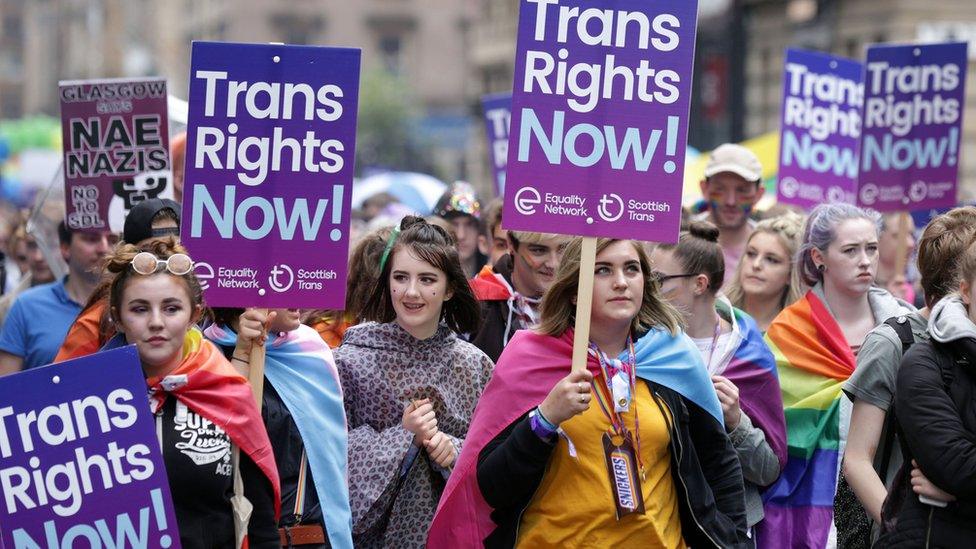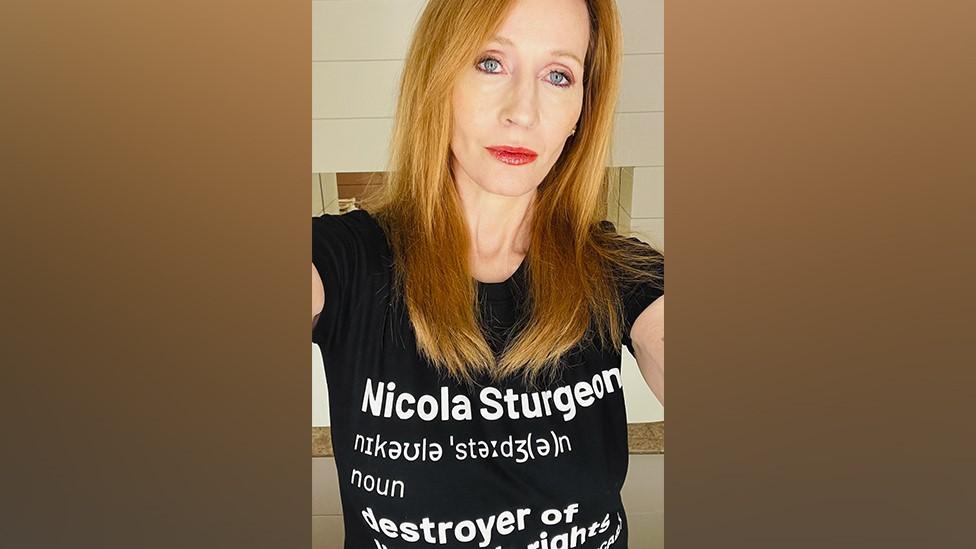Nicola Sturgeon knew of gender bill concerns, ex-minister says
- Published
Ash Regan says her conscience could not allow her to back the Gender Recognition Reform Bill
A former Scottish government minister who quit over its gender reform plans has said the first minister was "well aware" of her concerns.
Ash Regan said she voted against the proposals because she fears that they could put women and girls in danger.
Ms Regan also said the SNP should have allowed its MSPs to have a free vote on the issue.
She was one of nine SNP MSPs to defy the party whip when the reforms faced their first Holyrood vote last week.
The former community safety minister was the first SNP minister to quit over government policy since the party came to power in 2007.
The SNP is also facing its biggest-ever backbench rebellion, with seven of its MSPs voting against the proposals and another two abstaining - although the reforms still passed the first stage of the parliamentary process by 88 votes to 33.
In her response to Ms Regan's resignation, First Minister Nicola Sturgeon claimed that "at no stage have you approached me - or indeed the Cabinet Secretary for Social Justice - to raise your concerns about the Gender Recognition Reform Bill or the vote".
This was despite Ms Regan being one of 15 senior SNP politicians who signed a letter in 2019 urging the Scottish government not to "rush" into "changing the definition of male and female".
Speaking to journalists for the first time since her resignation, Ms Regan said: "The first minister was well aware of the concerns that I held on this issue."
But she declined to say whether or not she would be leaving the SNP.
Ms Regan is understood to have been speaking at the same time as a meeting of SNP backbenchers in the Scottish Parliament.

The gender reform proposals have been deeply divisive within the SNP, particularly online
She added: "We know that in many areas of life women are discriminated against, and so rightly they have legal protections in place.
"I was not convinced that those legal protections could continue to be upheld, and my conscience would not allow me to vote for a bill where I could not be 100% certain that women and girls would not be in danger."
Ms Regan stressed that she was not opposed to reforms that improve the lives of trans people, but argued that the debate over the issue needs to "get to a place where we can respect everybody's rights".
"For the SNP, the vote should have been a free vote. I think that healthy debate is important and I think that robust challenge is how we create good law. That is a strength and it is not a weakness", she said.
Ms Regan said it was clear to her from messages of support she had received that "many, many women across Scotland have deep concerns about this, and I believe their voices deserve to be heard".

Why are the reforms controversial?
People who want to apply for a Gender Recognition Certificate currently have to provide a medical diagnosis of gender dysphoria, external and to have lived as their acquired gender for at least two years.
The changes the Scottish government wants to make to the Gender Recognition Act would remove the need for a diagnosis and reduce the time someone needs to have lived as their acquired gender to three months.
They will still need to swear an oath that they will live in their acquired gender for the rest of their lives, with anyone who fails to do so potentially facing prosecution - although there will be a three-month "reflection" period during which they can change their mind.
In one of the most controversial measures, the reforms will also lower the age at which someone can apply to change their legal gender from 18 to 16.
Supporters of the proposals - including the first minister - say the current system needs to be modernised.
Social Justice Secretary Shona Robison told MSPs ahead of last week's that the changes would make the process "simpler, more streamlined, and more respectful of the privacy and dignity of trans men and women".
She said many trans people find the current system to be "overly medicalised, complex, intrusive and invasive", but opponents fear that allowing people to "self-identify" as a different gender could have a negative impact on women's rights, including in female-only spaces such as changing rooms, toilets and refuges.

A Scottish government spokesman said any minister who does not believe they can vote with the government on an issue should approach the first minister to discuss it.
He added that Ms Regan had been free to do so at any stage "but chose not to", adding: "Ms Regan's concerns were well known, publicly and privately, and the first minister's letter does not say she unaware of Ms Regan's views.
"Rather the letter makes clear that at no point did Ms Regan make use of the well-established practice by which any minister can approach the first minister when they have a difficulty.
"Nor did she make use of the specific facility to meet with the cabinet secretary for social justice on this issue, as other MSPs have done".
Ms Regan has received support from Harry Potter author JK Rowling, who tweeted that she was a "principled politician" who will "rightly be seen as a heroine when future generations of Scottish women look back at the profoundly misogynistic legislation currently being pushed through by the Sturgeon government".
Ms Rowling, who lives in Edinburgh, has been an outspoken critic of the gender reforms and recently posted a selfie of herself wearing a t-shirt that described Ms Sturgeon as a "destroyer of women's rights".

JK Rowling recently posted a picture of herself wearing a T-shirt that described Nicola Sturgeon as a "destroyer of women's rights"
Alyn Smith, the SNP MP for Stirling who supports the reforms, predicted last week that MSPs who had voted against the proposals would "be getting a torrid time from their constituency parties and local members soon enough".
Mr Smith added: "We don't do SNP a la carte and if you're elected on a manifesto then you play for the jersey."
Ruth Maguire, one of the SNP MSPs who voted against the proposals, told the Herald, external that Mr Smith should "reflect on the consequences" that his words could have, adding: "Too many female parliamentarians face abuse and threats of violence. It is incumbent on all of us to think carefully and do better."
The other SNP politicians who voted against were Stephanie Callaghan, Fergus Ewing, Kenny Gibson, John Mason and Michelle Thomson. Annabelle Ewing and Jim Fairlie abstained.
The party has not yet said what, if any, disciplinary action would be taken against them.


For all that they appear to be at odds, it is possible to reconcile the statements given by Ash Regan and Nicola Sturgeon.
The first minister would indeed have been "well aware" of Ms Regan's views, given she had made them clear in public previously.
Ms Sturgeon's contention is that they didn't have a direct, one-to-one conversation about the bill or the vote. Both things can be true.
It may be more difficult to find reconciliation between the two politicians themselves following this row.
The SNP group at Holyrood has never had a particularly mutinous streak to it. Open dispute with Ms Sturgeon is even rarer than members being at odds over policy.
So for all that talk of free votes and whipping procedures might seem like the stuff of the political bubble, such airing of laundry about party discipline is notable.
Ms Sturgeon's icy response to Ms Regan's resignation looked like an attempt to nip any spirit of rebellion in the bud.
But party chiefs will have to work hard to ensure that the punishment of the former minister and the other eight backbench rebels doesn't sow the seeds of more problems going forward.